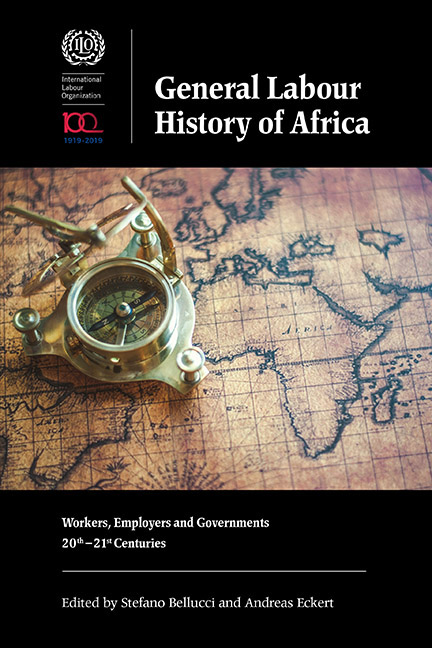Book contents
- Frontmatter
- Contents
- List of Maps and Figures
- List of Tables
- Notes on Contributors
- Foreword
- Acknowledgements
- The ‘Labour Question’ in Africanist Historiography
- Part I Free and Unfree Labour
- Part II Key Sectors
- Part III International Dimensions and Mobility
- Part IV Varieties of Work
- Part V Entrepreneurs and Self-Employment
- Part VI The State, Unions and Welfare
- 18 Labour and the State
- 19 Trade Unions
- 20 Social Welfare
- 21 Mutualism and Cooperative Work
- Part VII Conclusions
- Select Bibliography
- Index
19 - Trade Unions
from Part VI - The State, Unions and Welfare
Published online by Cambridge University Press: 21 September 2019
- Frontmatter
- Contents
- List of Maps and Figures
- List of Tables
- Notes on Contributors
- Foreword
- Acknowledgements
- The ‘Labour Question’ in Africanist Historiography
- Part I Free and Unfree Labour
- Part II Key Sectors
- Part III International Dimensions and Mobility
- Part IV Varieties of Work
- Part V Entrepreneurs and Self-Employment
- Part VI The State, Unions and Welfare
- 18 Labour and the State
- 19 Trade Unions
- 20 Social Welfare
- 21 Mutualism and Cooperative Work
- Part VII Conclusions
- Select Bibliography
- Index
Summary
This chapter will consider three phases in the history of African trade unions. The first is the organizational antecedents of trade unions. The second is unions structured along the lines of the formations in industrial societies. Unions began largely through the activities of expatriate or racial minorities, such as Greeks in Egypt, Indians in Kenya or white immigrants in South Africa. However, the native workforce learned from this model and became interested in this form of social force. In the conjuncture of the years just after the Second World War, large, territory-wide, union-led strikes exploded in many colonies (Nigeria, the Gold Coast, Tanganyika, the Rhodesias, French West Africa), not to speak of South Africa. Unions were inevitably linked to burgeoning nationalist movements.
After independence, the militancy of unions worked against the ambitions of new governments, which no longer favoured insurgency and were hostile to an autonomous modern civil society. Typically, unions were reorganized as bureaucratic structures responsible to the state, leaders were bought off or persecuted and growing economic problems undermined initial attempts by the state to reward wage workers. However, despite this, the struggle for union independence often continued under the surface and tended to become more effective with time.
In fact, this relatively quiescent phase was succeeded by a third phase, linked to grassroots movements calling for political democracy and the end to dictatorships or one-party rule in many countries. Trade unionism was critical in bringing about the end of apartheid in South Africa. This new phase has continued all the way to the Arab Spring in very recent years. Trade unions continue to throw up politically significant leaders and now function as a salient part of civil society. However, their importance in the success of democracy movements does not mean that they succeed, or know how to succeed, in turning such movements into government policy to the advantage of organized workers.
CONTEXTUALIZING AFRICAN TRADE UNIONS
In very different kinds of work situations where there is a sharp divide between workers and management, workers will organize, withhold their labour as a bargaining tool and turn into a collective force in particular situations in more or less every part of the world.
- Type
- Chapter
- Information
- General Labour History of AfricaWorkers, Employers and Governments, 20th-21st Centuries, pp. 523 - 552Publisher: Boydell & BrewerPrint publication year: 2019
- 1
- Cited by



